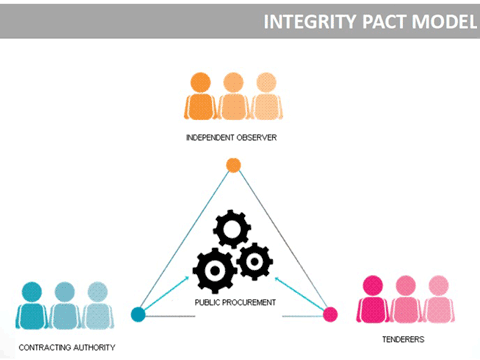Integrity Pacts
Figure 2: No Copyright Infringement Intended
Context:
- The Central Vigilance Commission (CVC) recently changed the criteria for appointing Independent External Monitors (IEM) to government agencies.
- It made the change months after issuing a revised standard operating procedure for the adoption and execution of the 'Integrity Pact' provision, which is intended to combat corruption in public procurement.
About Changes in the Rules:
- The zone of consideration for empanelment as IEMs has been revised. It now includes:
- Officers who have served as Additional Secretaries to the Government of India, as well as those who have served as Chairman-cum-Managing Directors (CMD) of Schedule 'A' public sector businesses.
- Persons who, at the time of retirement, were equivalent to or higher than the position of Additional Secretary to the Central Government.
- At the time of retirement, CMDs/MDs and Chief Executive Officers (CEOs) of public sector banks, insurance companies, and other financial organisations;
About Integrity Pacts:
- The 'Integrity Pact' is a contract between potential vendors/bidders and the buyer in which both parties commit to not engaging in any corrupt acts in any aspect or stage of the contract.
- Any infringement of the clause will result in bidders being disqualified and being barred from future business interactions.
- The accord also ensures that public procurement is transparent, equitable, and competitive.
About Independent External Monitors:
- The IEMs conduct an independent and objective evaluation of the documents to evaluate whether the parties have met their contractual responsibilities.
- After reviewing any contract-related complaints, they provide recommendations to the appropriate authorities.
- If they discover major anomalies that fall under the Prevention of Corruption Act, 1988, they may file a report to the top executive of the organisation or immediately to the Chief Vigilance Officer (CVO) and the CVC.
About Central Vigilance Commission:
- The CVC is the apex vigilance institution, independent of any executive authority, and is responsible for overseeing all vigilance activity under the Central Government as well as advising various authorities in Central Government organisations on how to plan, execute, review, and reform their vigilance work.
- It is a self-governing body that is only accountable to Parliament.
- On the recommendations of the Committee on Prevention of Corruption, chaired by K. Santhanam, the government established it in February 1964.
- The Central Vigilance Commission Act, 2003 (CVC Act) was passed by Parliament, giving the CVC legislative standing.




1.png)
